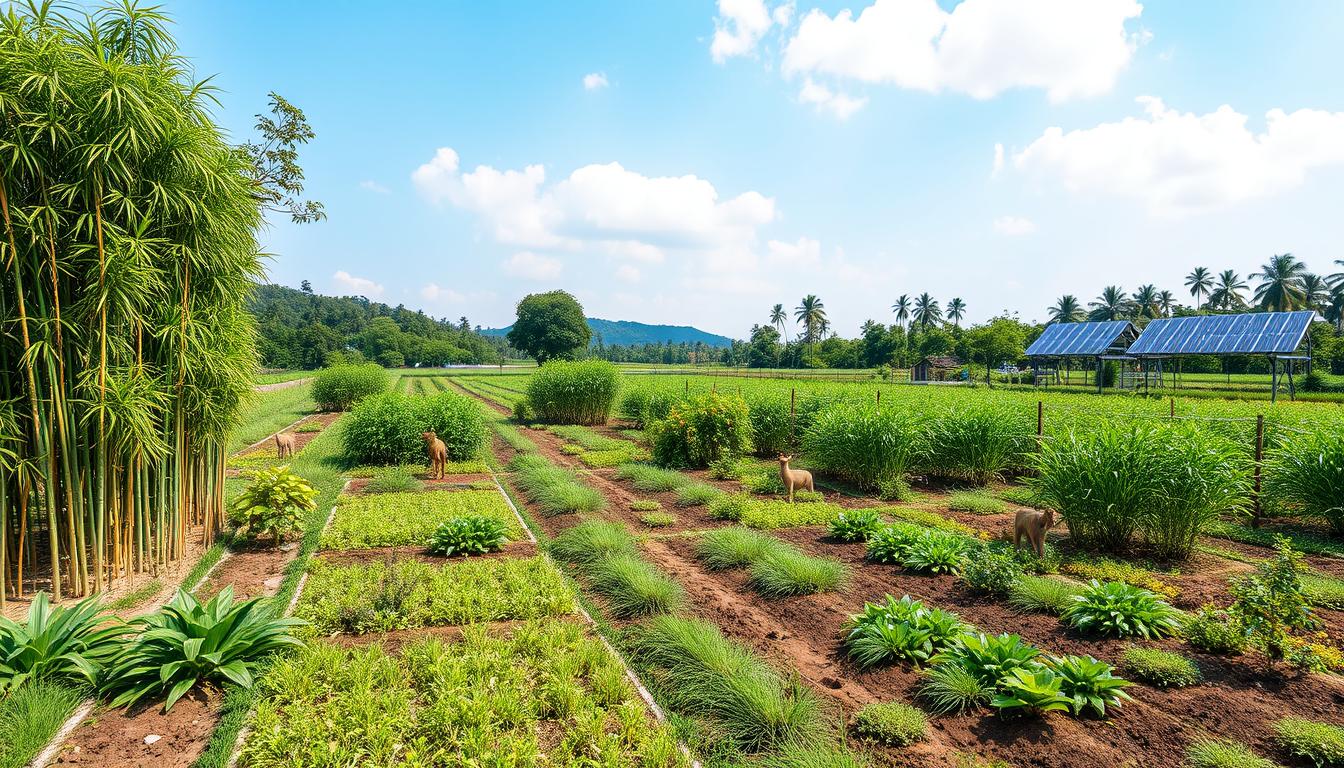In today’s world, sustainability is key for businesses and consumers. Panda, a leading food and beverage company, knows this well. They’re moving towards eco-friendly farming to keep their business going and protect the planet. This article looks into sustainable agriculture and how Panda is leading the way to a greener food system.
Key Takeaways
- Sustainable agriculture is a holistic approach to farming that balances environmental, economic, and social considerations.
- The key principles of sustainable agriculture include maintaining soil health, conserving water resources, promoting biodiversity, and reducing the use of synthetic inputs.
- Sustainable farming practices can lead to a doubling of crop yields in some cases, highlighting their potential to address global food security concerns.
- Panda is committed to implementing sustainable agriculture practices, including crop rotation and reducing the reliance on agricultural chemicals, to minimize its environmental impact.
- The adoption of sustainable agriculture can contribute to the overall goal of achieving a more sustainable food system and addressing the challenges posed by population growth and climate change.
What is Sustainable Agriculture?
Sustainable agriculture combines farming practices to meet food needs, protect the environment, and support farmers. It balances farming with nature, economy, and society. This approach is key to solving our food system’s big challenges.
Definition and Key Principles
Sustainable agriculture focuses on three main areas: the environment, making money, and fairness. These work together to build a strong, green farming system. The University of California says sustainability means meeting today’s needs without harming tomorrow’s. It’s about caring for both nature and people.
The main principles of sustainable agriculture are:
- Keeping soil healthy with cover crops, less tillage, and animals and crops together
- Using water wisely and improving how we use it
- Supporting biodiversity and natural ways to fight pests
- Using fewer synthetic fertilizers and pesticides
- Using diverse crops and trees together
Creating sustainable agriculture needs teamwork from many fields. Farmers, researchers, and others work together. It’s a slow journey, taking small steps towards a better food system.
The Need for Sustainable Farming Practices
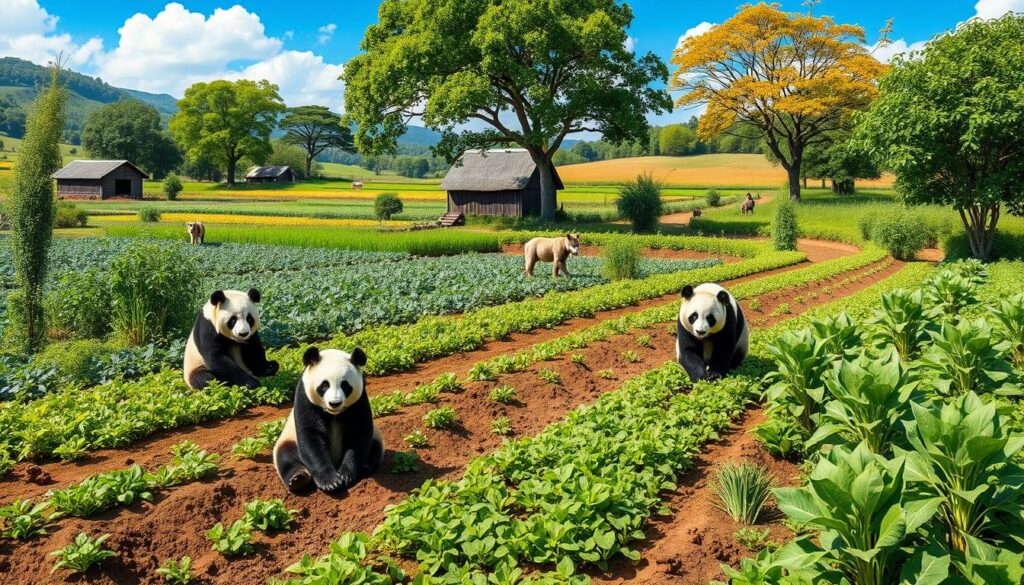
The call for sustainable agriculture is urgent. Traditional farming methods have harmed the environment a lot. Unsustainable agriculture costs the world’s economies about $3 trillion yearly. It’s vital to address this, as agriculture contributes around 13% of global environmental damage through harmful practices.
Sustainable agriculture is a better way. It reduces farming’s environmental harm while meeting food demand. Practices like crop rotation, cover cropping, and integrated pest management help. They improve soil health, save water, and cut down on synthetic inputs.
The benefits of sustainable farming are big. Sustainable agriculture uses up to 56% less energy, creates 64% fewer greenhouse gas emissions, and supports more biodiversity than traditional farming. Also, eating less meat by 10 grams a day can help our health and the planet.
Using sustainable agriculture can also create jobs and lower costs. It makes food cheaper for everyone. Reducing food waste could cut global carbon emissions by 8-10%, showing its importance.
As the world’s population grows, we need sustainable food production more than ever. Sustainable farming protects the environment and ensures food security for future generations.
| Sustainable Agriculture Benefits | Impact |
|---|---|
| Energy Use | Up to 56% less energy per unit of crops produced |
| Greenhouse Gas Emissions | 64% fewer emissions per hectare |
| Biodiversity Support | Greater levels of biodiversity compared to conventional farming |
| Meat Consumption Reduction | 10 grams per day could improve health and reduce emissions |
| Job Creation | 30% more jobs due to labor-intensive nature |
| Cost Reduction | Lower costs associated with production, processing, distribution, and marketing |
| Food Waste Elimination | Could reduce global carbon emissions by 8-10% |
Benefits of Sustainable Agriculture
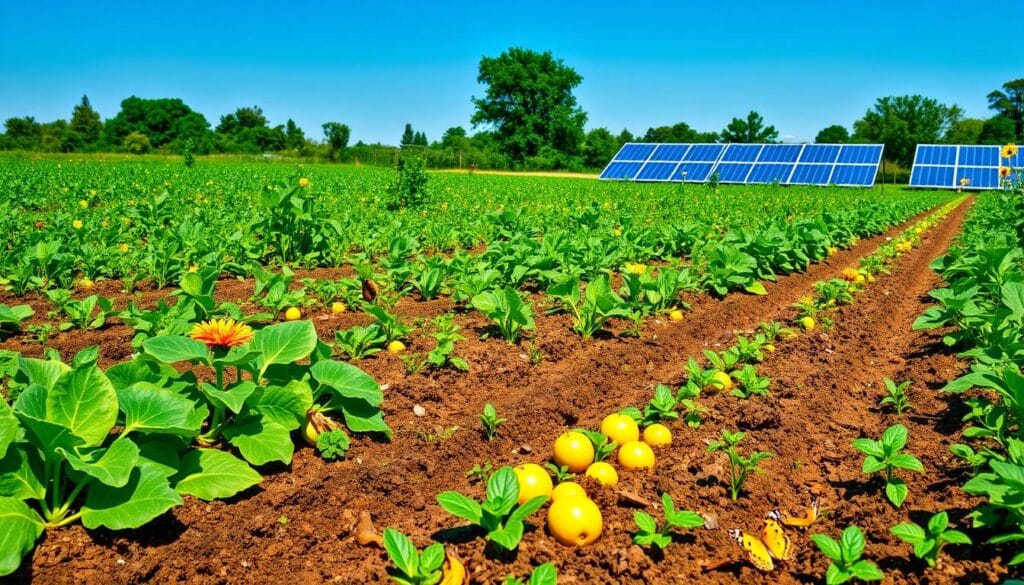
Sustainable agriculture brings many benefits to our environment, economy, and society. It helps save natural resources, protect wildlife, and keep the land healthy for the future.
Methods like crop rotation, cover cropping, and integrated pest management improve soil and water use. They also cut down on harmful chemicals. Organic farming, for example, can cut water pollution by half compared to traditional farming.
Economic Viability
Sustainable farming is also good for your wallet. It saves money by using fewer expensive chemicals and finding new ways to make money. Small farmers can save up to 30% on costs by using natural methods.
Social Responsibility
Sustainable farming also helps communities. It supports local food systems and makes sure everyone has access to healthy food. Agroforestry, for example, can boost crop yields by 40% and help fight climate change.
“Sustainable agriculture is not just about protecting the environment – it’s about building a more resilient, equitable, and prosperous food system for everyone.”
Sustainable Agriculture
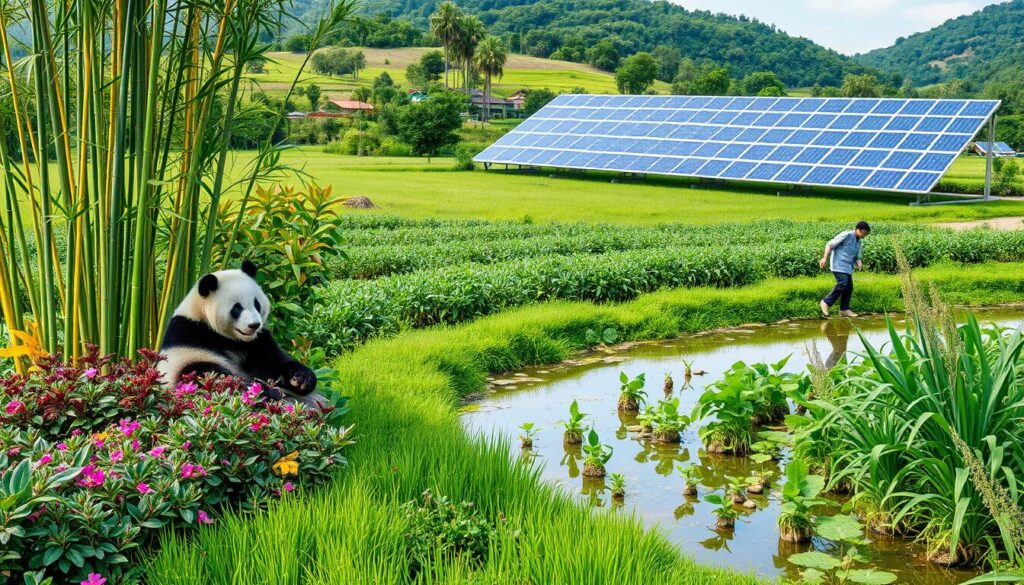
Sustainable agriculture is a way to grow food that doesn’t harm the planet for future generations. It uses practices that work with nature, keeping the environment healthy. This approach helps protect our natural resources and improves the quality of our environment.
By using crop rotation, cover cropping, and integrated pest management, farmers can make their soil better. They also save water and use fewer chemicals. These methods help farmers stay in business and provide healthy food while being kind to the environment.
Sustainable agriculture is key to solving the world’s food problems. It combines growing food with caring for the environment, making it both good for now and for the future. This way, we can build a more sustainable and strong food system for everyone.
| Sustainable Agriculture Practices | Benefits |
|---|---|
| Crop Rotation | Improves soil health, controls pests, and enhances crop yields |
| Cover Cropping | Reduces soil erosion, suppresses weeds, and increases soil organic matter |
| Integrated Pest Management (IPM) | Combines biological, cultural, physical, and chemical methods to minimize economic, health, and environmental risks |
| Agroforestry | Integrates the cultivation of trees and shrubs with crops or livestock, providing diverse products and ecosystem services |
| Direct Marketing | Enhances profits for farmers and ranchers by connecting them directly with consumers |
Sustainable agriculture is vital for a better future. It makes sure food is grown in a way that’s good for the planet, the economy, and society.
The Role of Hemp in Sustainable Agriculture
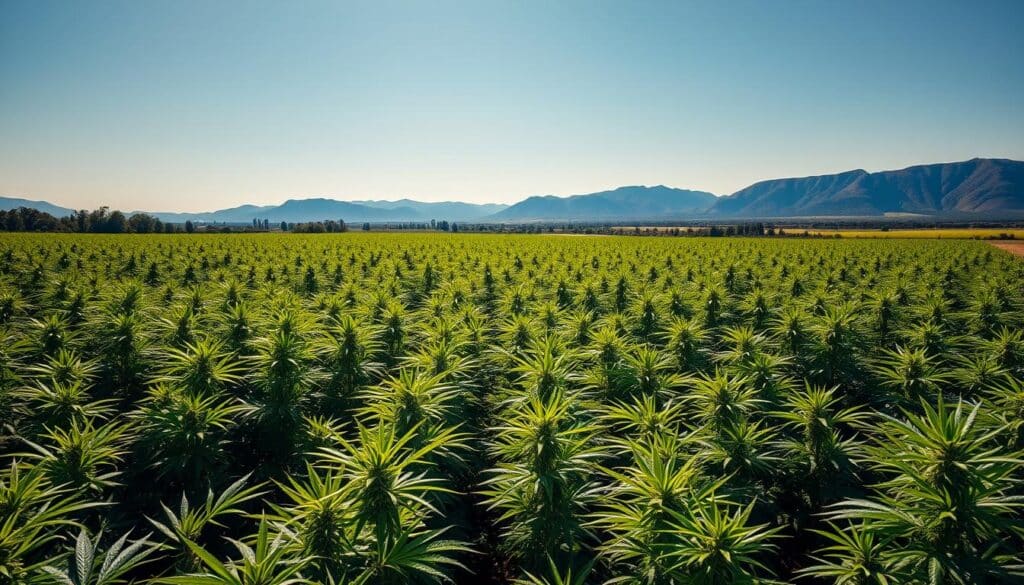
Hemp is becoming a key player in sustainable farming. It offers many benefits for the environment. This makes it a great choice for farmers looking to grow crops in a more eco-friendly way.
Environmental Benefits of Hemp Cultivation
Hemp is great for the planet. It can absorb up to 10 tons of CO2 per acre. This is more than many other crops can do.
Hemp also uses less water than crops like cotton. It grows well with little need for fertilizers and pesticides. This keeps the soil and water clean.
Hemp grows fast and can be harvested multiple times a year. It can grow in many climates and soils. This makes hemp a valuable crop for sustainable farming.
| Environmental Benefit | Metric |
|---|---|
| Carbon Sequestration | 10 tons of CO2 per acre |
| Water Usage | Fraction of water required by cotton |
| Fertilization and Pesticides | Minimal input required |
| Growth Rate | Multiple harvests per year |
| Climate Adaptability | Thrives in diverse climates and soil types |
Hemp’s benefits show its huge potential for sustainable farming. It helps protect our natural resources and fight climate change.
Implementing Sustainable Agriculture at Panda
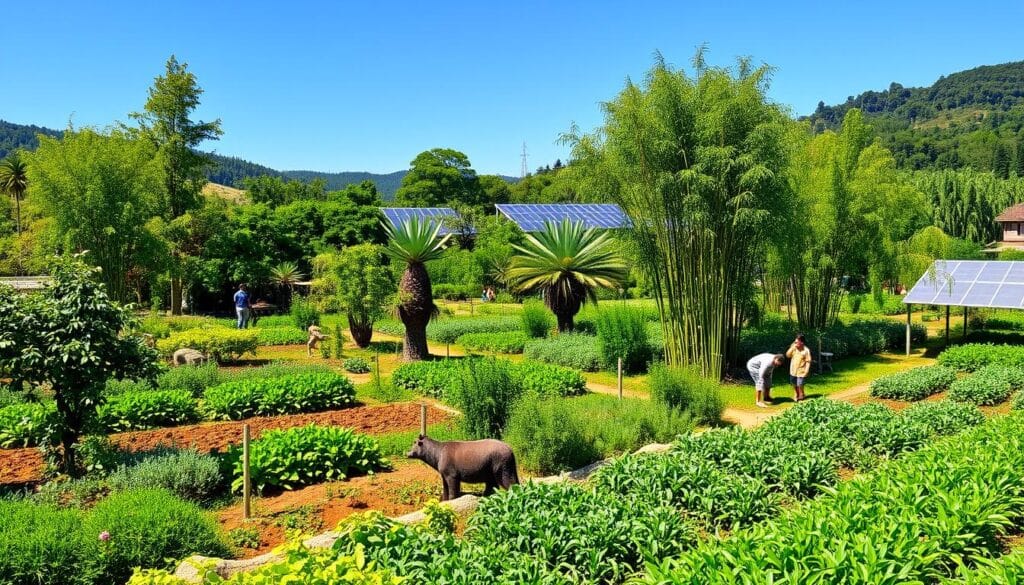
Panda, a leading food and agriculture company, is committed to sustainable agriculture. It aims to protect the environment and ensure the future of farming. Panda uses a variety of methods to achieve this goal.
It focuses on improving soil health by adding organic matter. This helps with nutrient cycling and water retention. Panda also works to preserve natural ecosystems and reduce synthetic inputs. By doing this, it promotes biodiversity and aims to make its farming practices more sustainable.
Panda’s Commitment to Eco-Friendly Farming
Panda is leading the way in eco-friendly farming. It’s setting a good example for the industry. The company has made significant progress in its sustainability efforts.
- A reduction of over 5 million liters of pesticide has been achieved.
- 2.5 million hectares of land have been protected from excessive pesticide spraying.
- 12,000 spray workers have been safeguarded from excessive pesticide exposure.
- Over 1.2 million tCO2e of carbon dioxide emissions have been reduced.
These achievements show Panda’s strong commitment to environmental sustainability. It’s dedicated to sustainable agriculture, benefiting the planet, people, and its own future.
Also Read : Eco-Friendly Practices: Simple Steps For A Greener Life
Conclusion
Sustainable agriculture is key to solving big problems in farming. It tackles environmental, economic, and social issues in the food world. By using methods like crop rotation and cover cropping, farmers keep soil healthy and water conserved. This also helps protect biodiversity and makes farming sustainable for the long run.
These practices do more than just help the environment. They also make farming more profitable and support the food system’s social goals. This shows how sustainable farming is good for everyone involved.
With climate change, biodiversity loss, and food shortages, sustainable farming is a vital solution. It protects our planet’s resources for the future. By working together, we can make sustainable farming the standard. This will lead to a better, more sustainable food system for everyone.
By choosing sustainable agriculture, we can create a food system that’s good for both the planet and people. This approach to farming is essential for a future that’s prosperous, fair, and green for all.
FAQs
Q: What is sustainable agriculture and food?
A: Sustainable agriculture and food refers to farming practices that prioritize environmental health, economic profitability, and social equity, ensuring a productive food system that can be maintained over the long term without depleting resources.
Q: How does soil health impact sustainable agriculture practices?
A: Soil health is crucial for sustainable agriculture practices as it affects crop production, soil fertility, and the overall productivity of the agricultural land. Healthy soil supports plant growth and helps maintain the ecosystem’s balance.
Q: What are some common sustainable practices in farming systems?
A: Common sustainable practices in farming systems include crop rotation, cover cropping, reduced tillage, organic farming, and integrated pest management. These practices enhance soil health, reduce chemical inputs, and support biodiversity.
Q: Why is local food important in sustainable food systems?
A: Local food is important in sustainable food systems because it reduces transportation emissions, supports local economies, and provides fresh, seasonal produce. It also fosters community connections and food justice by making food more accessible.
Q: What role does agroecology play in sustainable agriculture?
A: Agroecology plays a significant role in sustainable agriculture by integrating ecological principles into agricultural systems. It promotes biodiversity, enhances soil health, and encourages the use of renewable resources while considering the social and economic aspects of farming.
Q: How does industrial agriculture differ from sustainable agriculture?
A: Industrial agriculture focuses on maximizing production through monocultures, chemical inputs, and large-scale operations, often at the expense of environmental health. In contrast, sustainable agriculture emphasizes biodiversity, soil health, and ecological balance.
Q: What is food justice and how does it relate to sustainable food production?
A: Food justice is the movement to ensure equitable access to healthy food for all individuals, regardless of their socioeconomic status. It relates to sustainable food production by advocating for systems that support local food economies and address food insecurity.
Q: How can sustainable agricultural practices improve crop production?
A: Sustainable agricultural practices can improve crop production by enhancing soil fertility, promoting biodiversity, and reducing reliance on chemical fertilizers and pesticides. This leads to healthier crops and can increase resilience against pests and climate change.
Q: What management practices are critical for maintaining agricultural sustainability?
A: Critical management practices for maintaining agricultural sustainability include implementing crop rotation, adopting conservation tillage, using organic amendments, and practicing integrated pest management. These practices help conserve resources and promote long-term productivity.
Q: What is the significance of sustainable food systems in addressing global challenges?
A: Sustainable food systems are significant in addressing global challenges such as climate change, food insecurity, and resource depletion. They promote resilient agricultural practices that can adapt to changing conditions while ensuring equitable access to food and preserving the environment.
Source Links
- https://wwf.panda.org/discover/knowledge_hub/teacher_resources/webfieldtrips/sus_agriculture/
- https://www.abebooks.com/9789327216332/Organic-Farming-Sustainable-Agriculture-Panda-9327216334/plp
- https://wwf.panda.org/discover/our_focus/food_practice/sustainable_production/
- https://sarep.ucdavis.edu/sustainable-ag
- https://www.ucsusa.org/resources/what-sustainable-agriculture

